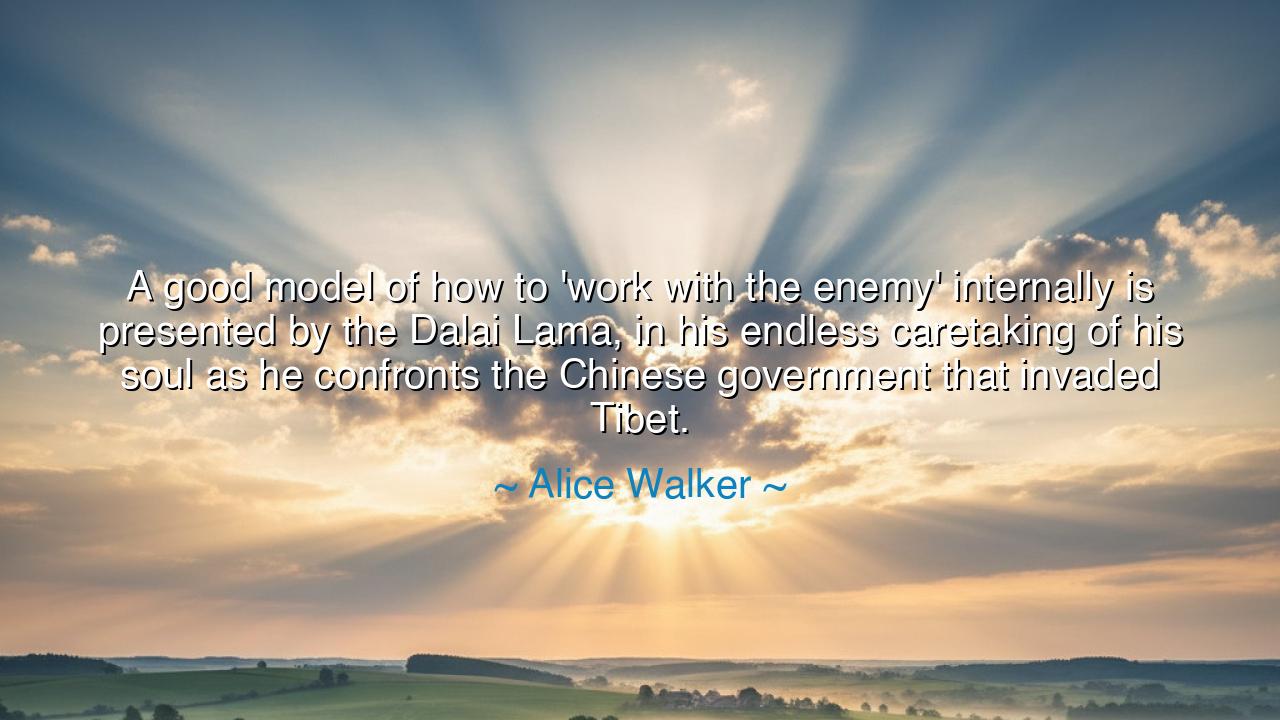
A good model of how to 'work with the enemy' internally is
A good model of how to 'work with the enemy' internally is presented by the Dalai Lama, in his endless caretaking of his soul as he confronts the Chinese government that invaded Tibet.






“A good model of how to ‘work with the enemy’ internally is presented by the Dalai Lama, in his endless caretaking of his soul as he confronts the Chinese government that invaded Tibet.” Thus spoke Alice Walker, a poet and seer of the human spirit, who looked not only upon the outer struggles of nations but upon the secret wars within the heart. In these words, she reveals a truth older than empires — that the greatest victory is not over the enemy without, but over the enemy within. For when hatred enters the soul, it conquers what no army can. The lesson she draws from the Dalai Lama, the exiled shepherd of Tibet, is one of profound strength through compassion: that to fight injustice without losing love is the highest art of peace.
The Dalai Lama, though stripped of his homeland by the might of a vast empire, has never surrendered his inner dominion. His temples were destroyed, his people scattered, his culture pressed beneath the heel of oppression — yet he did not curse his oppressors. Instead, he turned inward, tending his soul as a gardener tends a fragile tree in winter. He saw that anger, though righteous, is a fire that burns its bearer first. Thus, he chose to confront tyranny not with hatred, but with forgiveness, not with rage, but with patience, and not with vengeance, but with the steadfast discipline of the spirit. Alice Walker calls this the true model of “working with the enemy” — for it is the battle that keeps the soul from becoming what it resists.
In the ancient world, the sages understood this wisdom well. The philosopher Marcus Aurelius, emperor of Rome, wrote that the mind must stand uncorrupted even amidst the corruption of power. “You may not control what happens to you,” he said, “but you may control your response.” Likewise, the Dalai Lama, though powerless against armies, mastered the one kingdom no conqueror can invade: the kingdom of the heart. Through inner caretaking, he transformed suffering into compassion, exile into enlightenment. By refusing to let his enemy dictate his spirit, he turned oppression into a teacher and made peace a form of resistance.
Consider, too, the story of Nelson Mandela, who spent twenty-seven years in chains yet emerged without bitterness. He once said, “As I walked out the door toward the gate that would lead to my freedom, I knew that if I didn’t leave my bitterness and hatred behind, I’d still be in prison.” Mandela, like the Dalai Lama, learned that freedom is first an inner state. Both men fought mighty regimes, yet neither allowed hatred to define their struggle. This is what Alice Walker means: that the only way to work with the enemy — to live and act amidst cruelty without becoming cruel — is to keep the soul clean through constant vigilance and care.
To “caretake the soul” is not weakness; it is an act of sacred discipline. It means to pause when fury rises, to breathe when the heart cries for retribution, to see even in the enemy the reflection of one’s own humanity. This does not mean surrender, nor does it mean silence in the face of injustice. The Dalai Lama has never ceased to speak for Tibet, nor to demand freedom for his people. But he does so from a place of compassion, not contempt. His voice is firm, but gentle; his heart wounded, but unbroken. Such balance is the mark of true strength — for the one who masters himself cannot be defeated, even in exile.
Walker’s insight also carries a mirror for each of us. We may not face empires or invasions, but we all encounter enemies — those who betray us, mock us, wound us. The instinct is to harden, to strike back, to let resentment build walls around the heart. Yet in doing so, we become like those we despise. The practice of inner caretaking calls us to a different way: to guard our own peace as fiercely as we guard our pride, to confront wrongdoing without losing kindness, and to refuse the easy comfort of hate. In this, every soul becomes its own battlefield — and every act of mercy a victory.
So learn, O listener, from the Dalai Lama’s long endurance and from Walker’s wise reflection. When the world gives you reason to rage, tend your soul instead. Meditate, forgive, create, and love — not because your enemies deserve it, but because your own heart does. The world will always offer reasons for bitterness; peace must be chosen anew each day. And when you can walk among your enemies without losing compassion, when you can stand for justice without letting darkness into your heart — then you have won the deepest kind of freedom.
For the true revolution is not fought with weapons or power, but with clarity of spirit. Guard your heart as the Dalai Lama guards his. Confront evil, but do not become it. Work with your enemy, yes — but first, make peace with yourself. Then, like the mountain hermits of old, you will stand unshaken by the storms of the world, your spirit a light that no empire can extinguish.






AAdministratorAdministrator
Welcome, honored guests. Please leave a comment, we will respond soon